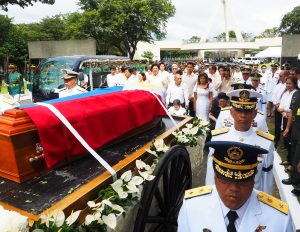Earlier this month, the Philippine House of Representatives passed a bill officially declaring September 11 a public holiday in the northern province of Ilocos Norte. The occasion for the holiday? The birthday of the Philippines’ former dictator Ferdinand Marcos.
The bill to establish “President Ferdinand Edralin Marcos Day” in the dictator’s home province received the support of 197 members, and was opposed by just nine. While the bill is yet to be approved by the Philippine Senate, it represents just the latest step in the slow rehabilitation of Marcos in the three decades since his fall from power.
Marcos ruled the Philippines with a mailed fist for two decades alongside his wife Imelda, whose prodigious amassing of luxury shoes became a global shorthand for corruption. For 14 years, he did so under Martial Law, during which his security services killed and tortured thousands and the Marcos family was accused of pilfering around $10 billion in state funds.
Marcos was toppled amid mass public demonstrations in 1986, and died in exile in Hawaii three years later. But in recent years, as memories of the depredations of Martial Law have faded, a significant number of Filipinos have begun to look back on the era as a lost “golden age.”
Far from facing accountability for widespread corruption and human rights violations, the Marcos family were allowed to return to the Philippines after 1989, and quickly returned to political prominence. Imelda, now 91, has served several terms in the House of Representatives, while the couple’s eldest daughter Imee was elected to the Senate last year, after nearly a decade as governor of the family stronghold in Ilocos Norte. Marcos’s son Ferdinand, Jr., known popularly as “Bongbong,” has also served terms as senator and Governor of Ilocos Norte. In 2016, he came within a percentage point of the vice presidency.
What explains this push to launder the Marcos legacy? One factor is undoubtedly the dynamic of regional politics in the Philippines, in which most of the country’s 80 provinces remain the bastions of rich land-owning families. In Ilocos Norte, Marcos’s relatives and former cronies have long filled the ranks of provincial administration, ensuring that the province remains a bastion of support. The family has also benefited from a degree of ethnic pride among Ilocanos (although not universally).
The rehabilitation effort has also clearly benefited from the support of the current President Rodrigo Duterte, who has long-standing ties to the Marcos family. During his first run for mayor of Davao City in 1988, Duterte benefited from the support of local Marcos cronies keen to claw back lost ground after their patron’s fall from power. “He was recruited by the Marcos forces,” a local journalist told me when I visited Davao City last year.
Since taking the presidency, Duterte has repeatedly expressed his admiration for Marcos, and kept a campaign promise to allow his remains to be buried in the Heroes’ Cemetery in Manila. In 2017, Duterte issued a presidential proclamation declaring that year’s anniversary a one-off holiday in Ilocos Norte, saying that the local community should be free to commemorate Marcos’ “life and contributions to national development as World War II veteran, distinguished legislator, and former president.”
However, this is not just a top-down phenomenon. While many are outraged and disgusted by the rehabilitation of Marcos’ legacy – last week, a group of Filipino wags on Twitter called on people to celebrate September 11 as “Thief’s Day” instead – it nonetheless enjoys the support of a significant slice of the nation’s population. During the 2016 election campaign, when Duterte first proposed his plan to rebury Marcos with “official honors,” one opinion survey found that 59 percent of Filipinos supported the idea. In the race for vice-president in 2016, Bongbong Marcos won more than 14 million votes, falling short by less than a percentage point.
This points to probably the most important reason for the rose-tinted reassessment of the Marcos dictatorship: the chronic governance failures that have smudged the line between the Marcos era and what came after. In 1986, Filipinos came together to reclaim their democracy after years of one-man rule. Yet the subsequent years saw little progress on the country’s hugely lopsided distributions of wealth and power.
President Corazon Aquino, who replaced Marcos as President in 1986, was herself a representative of the country’s tiny economic elite, the daughter of the wealthy sugar magnate Don José Cojuangco, who owned massive tracts of land in the province of Tarlac. She was also a cousin of the late Eduardo Cojuangco, who had been so cozy with Marcos that he was forced to accompany him into exile. (He, too, returned to the country in 1989 and later regained his respectability). Indeed, while claiming the mantle of democracy, none of the Philippines’ post-1986 governments has attempted any meaningful redistribution of wealth from the country’s reigning political dynasties to the toiling poor.
This has been fuel for political backlash. Over the last three decades, the Philippine economy has grown, but corruption remains deeply entrenched, as does the yawning divide between the rich and the rest. Daily life for millions remains a grind of survival. Indeed, the reasons for Marcos’s rehabilitation are not altogether different from those that prompted many to cast their votes for Duterte, who cheerfully profaned both the Pope and the U.S. President and promised to employ extreme violence to fight the country’s drug scourge. After so many empty promises, they probably figured they had nothing to lose.
The laundering of Marcos and his legacy stands as a reminder that a democratic system cannot sustain itself only by reference to abstract rights and freedoms. It also has to deliver.

































